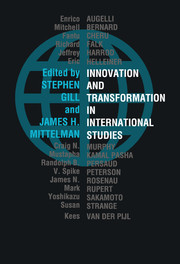Book contents
- Frontmatter
- Contents
- List of contributors
- Preface
- Acknowledgements
- Part I Rethinking and remaking the roots of global social and political theory
- Part II Political economy: the social and ecological anatomy of transformation
- Part III Transformation, innovation and emancipation in global political and civil society
- 9 Globalisation and contested common sense in the United States
- 10 The silent revolution and the weapons of the weak: transformation and innovation from below
- 11 Frantz Fanon, race and world order
- 12 Whose crisis? Early and post-modern masculinism
- Part IV Reflections on global order in the twenty-first century
- References
- Index of names
- Index of subjects
10 - The silent revolution and the weapons of the weak: transformation and innovation from below
Published online by Cambridge University Press: 05 July 2011
- Frontmatter
- Contents
- List of contributors
- Preface
- Acknowledgements
- Part I Rethinking and remaking the roots of global social and political theory
- Part II Political economy: the social and ecological anatomy of transformation
- Part III Transformation, innovation and emancipation in global political and civil society
- 9 Globalisation and contested common sense in the United States
- 10 The silent revolution and the weapons of the weak: transformation and innovation from below
- 11 Frantz Fanon, race and world order
- 12 Whose crisis? Early and post-modern masculinism
- Part IV Reflections on global order in the twenty-first century
- References
- Index of names
- Index of subjects
Summary
In the arcane and isolated world of academia, the ‘everyday forms of resistance’ of ordinary poor people across the globe rarely attract the attention of researchers or funding agencies until these local level struggles break out into spasms of violence that could threaten the status quo. The conventional view is that everyday resistance represents trivial coping mechanisms that are non-political and these merit no serious investigation. This view completely misses the point. The consequences of such silent resistance on the policy decisions of governments may not always be visible on the surface and one must carefully search for their long-term effects. Nevertheless, like an army of termites eating away the wooden structure of a house inch by inch, silent resistance by millions of poor peasants can have the same result, eroding the foundations of a political system – perhaps even making for a ‘silent revolution’.
Thus this chapter highlights various forms of resistance with reference to a number of African cases. Indeed, I hope to provide an account of both innovation and transformation ‘from below’ as seen and practised by marginalised groups in rural Africa. Although peasants in Africa have had no formal training in International Relations, they understand from experience how historical forces are constituted and how the prevailing global strategy of the Group of Seven nations and the dominant international financial institutions (e.g., World Bank and IMF) is based on the coldblooded abandonment of large numbers of humanity.
- Type
- Chapter
- Information
- Innovation and Transformation in International Studies , pp. 153 - 169Publisher: Cambridge University PressPrint publication year: 1997
- 7
- Cited by



